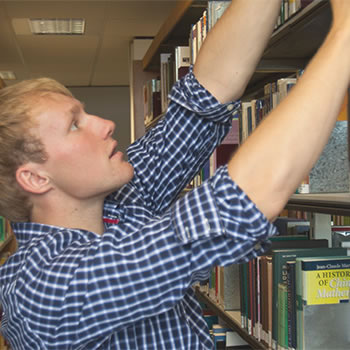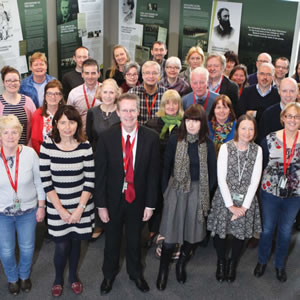- My Library Account
- Collections

Collections
The Library provides access to books, electronic resources, archives, special collections, and more to support your learning and research.
- Research

Research
The Library is committed to supporting your research needs with expert guidance and resources.
- Studying
- Academic Skills Service for Students
- Academic Writing Centre
- Assistive Technology Area
- Borrowing Limits, Lost Books & Fines
- Digital Literacy
- Equipment & More
- Group Study Rooms
- Library & IT Service Desk
- MakerSpace for Students
- Past Exam Papers
- Photocopying & Printing
- Shannon College Library
- Study Spaces
- Tour Timetable
- Using Other Libraries

Studying
The Library has all the resources and supports you need to be successful in your studies at undergraduate and postgraduate level. Whether you're just starting your studies or working on your final project, we're here to help.
- Teaching

Teaching
We are here to help lecturers and academic staff deliver quality teaching and support their students' success.
- About

- Workshops & Events
Archival Collections Acquisition Policy
QA819 Archival Collections Acquisitions Policy
Description
The purpose of the archives service is to acquire, preserve and make accessible archival collections held by the James Hardiman Library, and provide services in support of the research and information needs of the University Community and other appropriate users. It will also endeavour to attract researchers to the Library and the University, enhance the range of topics available to researchers, and provide a valuable resource within the overall library service and to the academic and research agenda of the University.
The Library’s archival collections are a treasure trove of unique material that support the research, teaching and learning activities of the University, as well as being a service to the whole community. These collections enable users to build their understanding and knowledge of events, people and organisations in our past and will help them to create new knowledge and a deeper understanding of our cultural and social history.
Statement of Authority to Acquire Material
The authority for the acquisition of material by the archives service comes from the University Librarian.
The authority to manage the acquisitions process for the archives service is vested in the Head of Collections.
Definition of Terms
- Records: Documents containing data or information of any kind and in any form, created or received and accumulated by an organisation or person in the transaction of business or the conduct of affairs. They are subsequently kept as evidence of such activity through incorporation into the recordkeeping system of the organisation or person. Records are the information by-products of organisational and social activity.
- Archival Value: The values, evidential and/or informational that justify the continuing retention of records as archives
- Evidential Value: The value for providing evidence of the origins, structure, functions, policies and operations of the person or agency that created the records. The three major categories or records having evidential value are those that:
- (1) Have continuing administrative, legal or fiscal value for the individual or body that created them, or for any subsequent bodies
- (2) Record details that may serve to protect the civic, legal property or other rights of individuals or the community at large
- (3) Reflect the development of the creating body, its structures, functions, policies, decisions and significant operations, or which reflect the evolution of the individual’s career, interests or activities
- Informational Value: The value for reference deriving from the information the records contain, as distinct from their evidential value. Records and archives often contain information that has reference or research uses not envisaged by its creators.
- Archives: Those records that are appraised as having continuing value. Traditionally the term has been used to describe records no longer required for current use which have been selected for permanent preservation.
- Archivist: A person, professionally educated, trained and experienced, responsible for the management or administration of archives and/or records by appraising and identifying records of continuing value, by documenting and preserving archives in their context and by enabling and facilitating their continuing use
- Deposit: An addition to the holdings or collection of an archives service. A deposit is usually a transfer of material but may also be a donation or a loan for either a short-term or an indefinite period.
- Depositor: The person legally responsible for the records deposited
- Donation: A voluntary deposit of records, involving the transfer of legal ownership as well as custody of the archives
- Donor: A person or organisation who has donated records to the archives service
Method of Acquisition
The James Hardiman Library Archives will acquire material by donation, loan or purchase. In the case of donation or loan, material deposited with the archives service will be covered by a deposit agreement which will outline the conditions of transfer of the material to the archives service (see Appendix A for sample Conditions of Acceptance of Donated).
Current Collection Strengths
The Library’s archival collections are a source both of pride and competitive advantage for the University with strengths in the following areas:
- Academic papers reflecting the research and teaching outputs of the University
- Business collections relating to the west of Ireland, reflecting productivity and financial matter
- Community development collection
- Collections relating to the socio-economic, cultural and political development of the West of Ireland, and that strengthen the University’s links to the region and local community
- Irish-language collections, including Irish language activism and Irish folklore
- Landed Estate papers relating to the west of Ireland, reflecting legal, estate management and family material associated with certain estates
- Landscape and physical environment collections
- Literary collections in both Irish and English
- Political, legal and human rights collections, with a particular emphasis on Northern Ireland, the war of independence and the civil war
- Theatre, film and the performing arts collections
Statement of Acquisition Priorities
Our priority is to acquire the records of institutions, associations and individuals that augment the strengths of our current holdings, as described above.
Prospective collections must contribute to and facilitate the research and teaching activities of NUI Galway, particularly the areas of research strength of the University, as per the University’s research strategy:
- Biomedical Science and Engineering
- Informatics, Physical and Computation Sciences
- Environment, Marine and Energy
- Applied Social Science and Public Policy
- Humanities in Context
The service hopes to work with other places of deposit in the development of coherent and comprehensive access to archival collections connected with the West of Ireland.
In the case of institutions giving us accruals of material, the development of a coherent records management programme would be desirable, to ensure that the archives service acquires that material which most fully reflects the business of the institution.
The archive will take records in any format once their preservation and access can be maintained to archival standards. However, the Archives Service is not equipped in terms of space or expertise to collect artefacts or physical objects.
General Conditions Covering Acquisition
Material brought into the repository should comply with the areas of interest outlined in Statement of Acquisition Priorities
In the case of all material brought in under transfer, loan, donation or purchase, the depositor must be the authorised person to transfer legal title to the material.
Material must undergo archival appraisal and be recommended for retention by the archival team of the James Hardiman Library. The material must be of archival value, as outlined in Section 3, and of scholarly interest. The material must be in reasonable physical condition, allowing the archives service to care for it in the appropriate manner.
Material should, in as far as possible, be free of legal encumbrances and access restrictions. In the event of restrictions being placed on access by the depositor for reasons of privacy etc., these restrictions shall be clearly outlined in the deposit agreement and should not unduly inhibit the research potential of any acquired collection.
Material will either become the property of the James Hardiman Library Archive, or its responsibility, to be administered in accordance with the policies and procedures of the James Hardiman Library.
Download PDF copy of the policy: QA819 Archival Collections Acquisitions Policy











